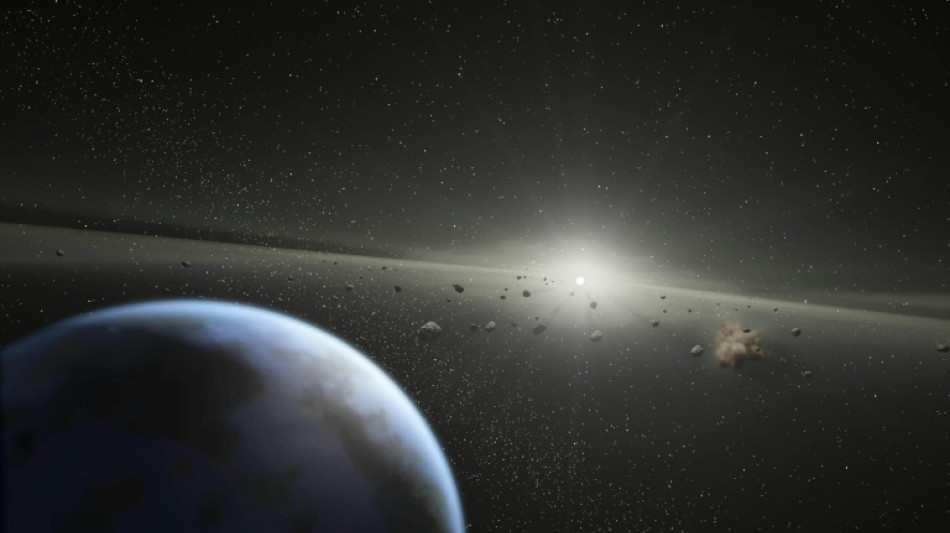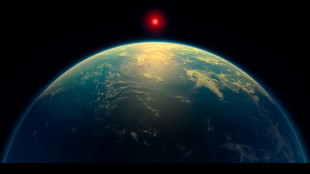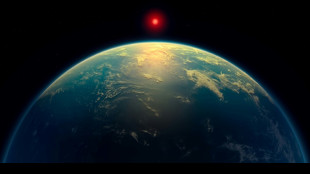
-
 Pakistan foreign minister arrives in Kabul as Afghan deportations rise
Pakistan foreign minister arrives in Kabul as Afghan deportations rise
-
Heat and Grizzlies take final spots in the NBA playoffs

-
 Iran, US to hold second round of high-stakes nuclear talks in Rome
Iran, US to hold second round of high-stakes nuclear talks in Rome
-
Humanoid robots stride into the future with world's first half-marathon

-
 Migrant's expulsion puts Washington Salvadorans on edge
Migrant's expulsion puts Washington Salvadorans on edge
-
Plan for expanded Muslim community triggers hope, fear in Texas

-
 Pakistan foreign minister due in Kabul as deportations rise
Pakistan foreign minister due in Kabul as deportations rise
-
White House touts Covid-19 'lab leak' theory on revamped site

-
 Dodgers star Ohtani skips trip to Texas to await birth of first child
Dodgers star Ohtani skips trip to Texas to await birth of first child
-
US senator says El Salvador staged 'margarita' photo op

-
 Ford 'adjusts' some exports to China due to tariffs
Ford 'adjusts' some exports to China due to tariffs
-
Thomas maintains two-shot lead at RBC Heritage

-
 US to withdraw some 1,000 troops from Syria
US to withdraw some 1,000 troops from Syria
-
Four killed after spring storms wreak havoc in the Alps

-
 Spurs' Popovich reportedly home and well after 'medical incident'
Spurs' Popovich reportedly home and well after 'medical incident'
-
Trump goes to war with the Fed

-
 Celtics chase second straight NBA title in playoff field led by Thunder, Cavs
Celtics chase second straight NBA title in playoff field led by Thunder, Cavs
-
White House site blames China for Covid-19 'lab leak'

-
 Norris edges Piastri as McLaren top Jeddah practice
Norris edges Piastri as McLaren top Jeddah practice
-
Trump warns US could ditch Ukraine talks if no progress

-
 Judge denies Sean 'Diddy' Combs push to delay trial
Judge denies Sean 'Diddy' Combs push to delay trial
-
80 killed in deadliest US attack on Yemen, Huthis say

-
 Lebanon says two killed in Israeli strikes in south
Lebanon says two killed in Israeli strikes in south
-
Trump says US will soon 'take a pass' if no Ukraine deal

-
 F1 success is 'like cooking' - Ferrari head chef Vasseur
F1 success is 'like cooking' - Ferrari head chef Vasseur
-
Cycling mulls slowing bikes to make road racing safer

-
 Macron invites foreign researchers to 'choose France'
Macron invites foreign researchers to 'choose France'
-
Klopp 'happy' in new job despite Real Madrid rumours: agent

-
 Alcaraz into Barcelona semis as defending champion Ruud exits
Alcaraz into Barcelona semis as defending champion Ruud exits
-
Vance meets Italy's Meloni before Easter at the Vatican

-
 Evenepoel returns with victory in Brabantse Pijl
Evenepoel returns with victory in Brabantse Pijl
-
Maresca confident he will survive Chelsea slump

-
 Mob beats to death man from persecuted Pakistan minority
Mob beats to death man from persecuted Pakistan minority
-
Lebanon says one killed in Israeli strike near Sidon

-
 Arsenal's Havertz could return for Champions League final
Arsenal's Havertz could return for Champions League final
-
US officials split on Ukraine truce prospects

-
 Client brain-dead after Paris cryotherapy session goes wrong
Client brain-dead after Paris cryotherapy session goes wrong
-
Flick demands answers from La Liga for 'joke' schedule

-
 'Maddest game' sums up Man Utd career for Maguire
'Maddest game' sums up Man Utd career for Maguire
-
Trial opens for students, journalists over Istanbul protests

-
 Gaza rescuers say Israeli strikes kill 24 after Hamas rejects truce proposal
Gaza rescuers say Israeli strikes kill 24 after Hamas rejects truce proposal
-
'Really stuck': Ukraine's EU accession drive stumbles

-
 'Not the time to discuss future', says Alonso amid Real Madrid links
'Not the time to discuss future', says Alonso amid Real Madrid links
-
74 killed in deadliest US attack on Yemen, Huthis say

-
 Southgate's ex-assistant Holland fired by Japan's Yokohama
Southgate's ex-assistant Holland fired by Japan's Yokohama
-
Vance meets Meloni in Rome before Easter at the Vatican

-
 Ryan Gosling to star in new 'Star Wars' film
Ryan Gosling to star in new 'Star Wars' film
-
Hamas calls for pressure to end Israel's aid block on Gaza

-
 Russia says Ukraine energy truce over, US mulls peace talks exit
Russia says Ukraine energy truce over, US mulls peace talks exit
-
58 killed in deadliest US strike on Yemen, Huthis say


Where are all the aliens?: Fermi's Paradox explained
Astronomers raised hopes that humanity might not be alone in the universe by announcing on Thursday they have detected the most promising hints yet of life on a distant planet.
But given the age and vastness of the universe, a different question has long puzzled some scientists: why haven't we already come in contact with aliens?
"Where is everybody?" Enrico Fermi asked fellow famous physicists including Edward Teller over lunch in 1950.
This quandary was named Fermi's Paradox.
"It's a numbers game," Jason Wright, the director of the extraterrestrial intelligence centre at Pennsylvania State University, told AFP.
The Milky Way is around 10 billion years old and is home to more than 100 billion stars.
This suggests there is likely a mind-boggling number of potentially habitable planets in our home galaxy alone.
That could include K2-18b, where astronomers said Thursday they have detected signs of a chemical that is only produced by microbial life on Earth.
Wright said Fermi's Paradox essentially suggests that -- given enough time -- "every alien species will eventually have their own Elon Musk who will go out and settle the next star over".
That we have not yet heard from aliens is known as "the mystery of the great silence".
- So what are the theories? -
At least 75 speculative solutions to Fermi's Paradox have been proposed so far, according to a 2015 book, though Wright guessed more have been added since.
First, it is possible that humanity has not yet detected alien life because there isn't any -- we are truly alone.
Many scientists feel this is unlikely.
Some 87 percent of over 1,000 scientists in relevant fields surveyed in Nature Astronomy earlier this year agreed there is at least a basic form of extraterrestrial life.
More than 67 percent agreed that intelligent aliens are out there.
Of course, it is also possible that aliens are already here and we have not noticed -- or that it has been covered up.
Or interstellar space could just be too difficult to traverse, the distances too vast, the resources needed too great.
- What if there is a 'great filter'? -
Another theory is that there is some kind of "great filter" that prevents life -- or intelligent life -- from occurring in the first place.
Or perhaps there is some kind of barrier that stops civilisations from advancing beyond a certain point.
For example, once civilisations develop the technology to travel through space, they might tend to destroy themselves with something like nuclear weapons.
Or maybe they burn through their planet's natural resources, or make their climate unliveable.
Some of these theories seem to be influenced by fears for human civilisation -- the one example we have of intelligent life.
But Wright felt this was unlikely because any such barrier would have to be the same across the whole universe.
It would also have to make the species go totally extinct every time, otherwise they would eventually bounce back and try again at space travel.
- Are we in a zoo or planetarium? -
There are even more galaxy-brained ideas.
Under the "zoo" hypothesis, technologically advanced aliens would be leaving humans alone to observe us from afar, like animals in a zoo.
The "planetarium" hypothesis posits that aliens could be creating an illusion that makes space seem empty to us, keeping us in the dark.
- ...or a 'dark forest'? -
This theory got its name from the second book in Chinese author Cixin Liu's science-fiction series "The Three-Body Problem".
It posits that the universe is a "dark forest" in which no one wants to reveal their presence lest they be destroyed by others.
There are other hypotheses that aliens prefer to "transcend" to another plane of existence -- which some have compared to virtual reality -- so don't bother with interstellar travel.
- Why would they all be the same? -
But there is a big problem with many of these "so-called solutions," Wright said.
They tend to assume that all the hypothetical kinds of aliens across the universe would all behave in the same way -- forever.
This has been dubbed the "monocultural fallacy".
Wright, who has used SETI telescopes to search for radio signals or lasers from the stars, also pushed back against the idea that humanity would necessarily have already picked up on any alien signal.
Aliens could be sending out messages using all sorts of unknown technology, so maybe the galaxy is not as silent as we think, he said.
"Those of us looking for life in the universe generally don't think of the Fermi paradox or the great silence as such a big problem."
K.Sutter--VB


